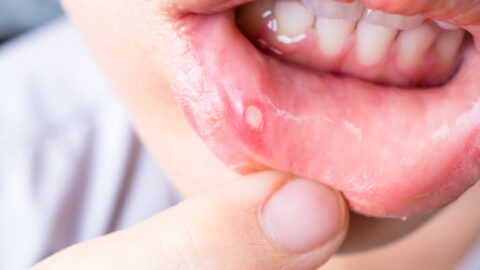Teeth removal is a solution to handle damaged teeth when they cannot be preserved anymore. However, this process is not always smooth. If a tooth is not removed properly, it will greatly affect oral health, for example, infection after wisdom teeth removal. This condition can be identified through many specific signs.
What is infection after wisdom teeth removal?
Infection after teeth removal is not uncommon, and most cases are after wisdom teeth removal. Causes often stem from improper hygiene or errors in the implementation process.
This is a dangerous complication. If the patient is not treated promptly and properly, it will lead to serious consequences such as maxillary sinus infection, infective endocarditis, necrosis in the floor of the mouth, etc., and even the risk of death.
8 infection signs after wisdom teeth removal
1. Dyspnea, swallowing difficulties
Improper teeth removal can lead to dislocation of the chewing joint, causing discomfort such as swallowing difficulty, chest tightness, dyspnea, etc. Besides, allergies to antibiotics, anti-inflammatory drugs are also the causes of infected teeth removal.
2. Excessive bleeding in surgical wounds
Bleeding after teeth removal may originate from damaged gums and blood vessels in the mucosa. Blood can flow from the periosteum to the teeth. Usually, bleeding after teeth removal is 60 minutes maximum. After that, the clotting process will take place. However, if the bleeding continues 1-2 days later, this is likely a sign of infection after teeth removal.
3. Swollen gums around the removal area
Before teeth removal, the doctor will usually inject an anesthetic, which helps reduce pain. However, after 2 hours, the pain and discomfort will return, lasting for about 1 week. Along with that is facial and cheek swelling.
In some cases, the prolonged pain after wisdom teeth removal stems from infected gums. When the tooth is removed, the gums are subjected to mechanical impact, causing the soft tissue around the removal area to swell. The patient may have edema on one side of the face, followed by strong, prolonged pain. If this condition is not treated promptly, it can lead to complications that cause serious infections.
4. Bad breath
Bad breath does not stem from wisdom teeth removal. However, bad breath happens after some cases of wisdom teeth removal. This is due to improper care and hygiene processes. Bad breath with swelling, pain, and pus may signal an infected wisdom tooth removal.
5. Numbness after 1 week of teeth removal
Pain is a common phenomenon after wisdom teeth removal. However, the condition will be reduced after about 1-3 days with proper care. In case it lasts more than 1 week, this may be a sign of gums’ inflammation at the root of the wisdom tooth. Patients need to see a doctor for prompt treatment to avoid the damage spreading to other parts.
6. Pus in removed wisdom teeth area
When eating, food is easy to get caught in the gums’ crevices, creating a favorable growing environment for bacteria. Over time, this condition will lead to infection, the wound will be more swollen, and pus will appear.
7. Pain when opening or closing the mouth
If the pain after teeth removal becomes severe, it can be difficult for patients to open and close their mouths. This is a sign of an infected tooth socket, caused by improper hygiene after the removal.
8. Fever in 1 week after teeth removal
For patients with weak host factors, fever after wisdom teeth removal is inevitable. This condition will usually last 1-2 days after removal. However, if the fever continues after 1 week, the patient will need to see a doctor. This could be an infection due to the remaining root of the tooth.
Causes of infection after removal
There are many causes for infection after wisdom teeth removal. They are derived from two factors – errors in the implementation process and improper hygiene, specifically:
- Inappropriate hygiene after teeth removal. Food sticks to the teeth removal area, causing bacteria to form and infect wounds.
- Smoking immediately after teeth removal. Direct contact of cigarette smoke with an open wound causes inflammation in the teeth socket.
- Teeth removal tools are not thoroughly disinfected. Therefore, bacteria have favorable conditions to grow and attack.
- Doctor’s skills.
- Patients with diseases such as teeth decay, pulpitis, periodontitis, etc.
- Teeth that need to be removed are too deep, causing damage to the gums and jawbone in the process. This is also an opportunity for bacteria to enter, causing infection.
Treatment for infection after wisdom teeth removal
Patients can apply the following methods to treat infection after wisdom teeth removal:
- Visit a hospital or a dentist
- Apply cold packs on the outside of your cheeks to reduce pain
- Perform proper hygiene
- Establish a healthy diet, prioritize soft foods
- Use antibiotics as prescribed by doctors
- Use mouthwash regularly










